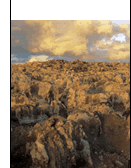

 |
|||
|
Word Play Stewart
Edelstein ’70 attributes his love of words to his former Oberlin
English by
Allison Tracy ’66
On a sleepy Saturday afternoon in January, laughter and verbal play erupted from room 215 Wilder Hall, where some 30 students showed up for a talk on eglish etymology given by a total unknown: Stewart Edelstein, Oberlin Class of 1970. Citing sources such as Dr. Seuss and hypotheses such as the “Bow-Wow” theory of linguistics (the notion that language evolves from imitation), Edelstein cheerfully mapped the 5,000-year evolution of our English family tree from its Indo-European roots and Greek, Latin, and Anglo-Saxon offshoots to the grafted branches of foreign derivatives, eponyms, onomatopoeias, and neologisms. Along the way, he threw out challenges, which the students fielded deftly with answers gleaned from Scrabble, Trivial Pursuit, SAT exams, eclectic reading, and their own experiences. His audience easily defined the term palindrome (a word spelled the same backwards and forwards); knew when to expect the next palindromic year (110 years from now); and came forward with quick semordnilaps (words that spell a new word when read backwards), such as nap, was, and star. The students easily grasped Edelstein’s examples of portmanteaus—melded words like motel (motor and hotel), electrocute, and Pearlygate (a scandal about televangelists). And they waded boldly into the world of Edelsteineologisms—words that he himself invented. “Try
this,” he challenged. “What’s a word for the brief
appearance of a cat in a movie?” It was an Oberlin moment. What’s
in a Word? It will be another Oberlin moment—one that demonstrates how the Oberlin liberal arts experience, with its exceptional faculty-student relationships, impels alumni beyond their fields of specialization. “Mining words” is how Edelstein labels his etymological hobby, echoing Ralph Waldo Emerson’s description of words as “fossil poetry.” In his introduction to Dubious Doublets, Edelstein hearkens us to jurist Oliver Wendell Holmes’ pretty metaphor: A word “is not a crystal, transparent, and unchanged,” but rather, the “skin of a living thought.” Edelstein’s interest in the topic is almost Darwinian; he seeks out the original concepts that shaped the evolution of a word to spawn generations of new forms. The geography of words fascinates him—their travels through time in the vocabularies of conquerors, barbarians, and immigrants, and today, through cyberspace, recognizable mostly as acronyms or “PCisms.” His book offers a broad liberal arts view of the English language; Wiley and Sons dubs it “an evergreen” with potential for a long shelf life and marketing spin-offs such as Doublet-a-Day calendars. Gaining
the publisher’s attention was no easy feat, given that Edelstein
lacked the typical entry credentials. He’s not an academic
with documented expertise. Nor is he a journalist like William Safire
with a body of clips about language currency, although Safire once
credited Edelstein in his New York Times column for properly
disabusing him of an etymological error. The Times also published
an Edelstein-authored op-ed piece about eponyms. But in today’s
competitive publishing market, that guarantees nothing. The
alum’s preferred approach to etymology is not irrelevant to
how he earns his living. He is a trial lawyer dealing in commercial
litigation, where persuasion and case precedents are central. In
the Oberlin tradition, he has carried it a step further as a tutor
in clinical studies at Yale Law School, teaching a nuts-and-bolts
course in courtroom practices—the examination of witnesses,
jury selection, opening statements, and closing arguments. Go to page 1 | 2 | UNLIKELY WORD PAIRS of Word Play |
||||
|
back to top |
